The top 10 feminist moments that defined 2018
From the Women's Wave that dominated the midterm elections to women of all ages raising their voices and demanding change around gender equality, gun control, and sexual assault, and more, 2018 has undoubtedly been another "Year of the Woman."
And we're not stopping here.
But before we say goodbye to 2018 and usher in what we like to call the new Era of the Woman, MAKERS looks back on the top 10 feminist moments that defined this year .
Sister survivors stand in solidarity against disgraced former USA Gymnastics Doctor
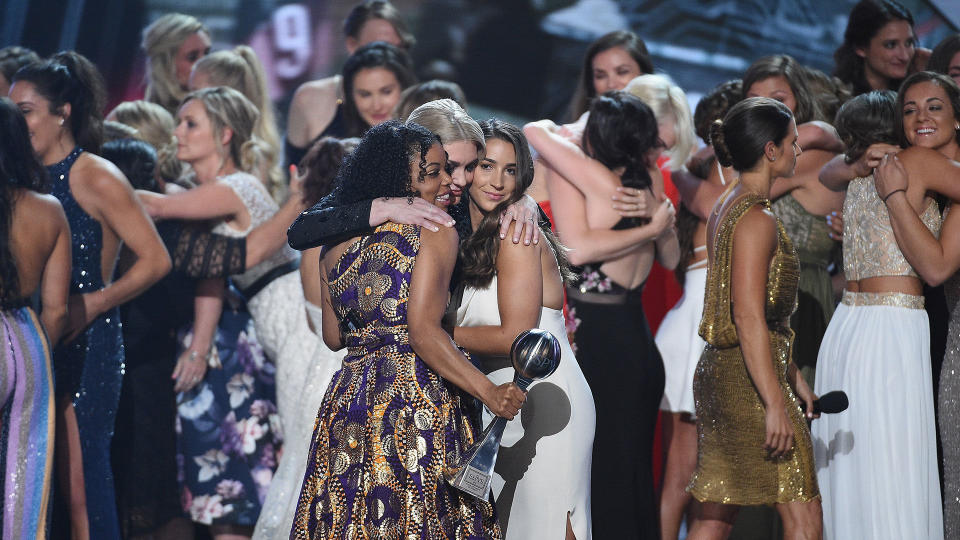
"Imagine feeling like you have no power and no voice," Olympic gymnast Aly Raisman said at the trial of disgraced doctor Larry Nassar. "Well, you know what, Larry? I have both power and voice and I am only beginning to just use them."
In January, Raisman and 155 brave sister survivors testified against their abuser, sharing their harrowing stories of sexual abuse at the hands of the former USA gymnastics physician. Asked to submit victim impact statements at the trial, an army of women traveled to a Michigan courtroom to confront the serial child molester, knowing they were standing up for what could be an "infinite number" of unidentified victims. The result? Judge Rosemarie Aquilina sentenced him to up to 125 years in jail. "We may suffer alone," Raisman said, "but we survive together."
Beyoncé becomes the first black woman to headline Coachella

In the middle of her epic performance in Indio, Calif., Beyoncé paused to say, "Thank you for letting me be the first black woman to headline Coachella."
No, Queen Bey, thank you. Fans dubbed the April event "Beychella" as the singer transformed the stage into an electric tribute to black culture by including nods to historically black universities and fraternities, singing parts of "Lift Every Voice and Sing" which is often called the black national anthem, and incorporating the words of strong black women into her set such as celebrated writer Chimamanda Ngozi Adichie. Bow down, b-tches.
Thousands take part in the March for Our Lives

Following the devastating school shooting at Marjory Stoneman Douglas High School, the student survivors made one promise: #NeverAgain. On March 24, the Parkland teens organized March for Our Lives, the largest single-day protest ever in Washington D.C. which drew an estimated 800,000 people to advocate for more gun control.
Emma Gonzalez stood in silence in front of the massive crowd for six minutes and 20 seconds, the same amount of time students were hiding for their lives in closets and classrooms as an active shooter unleashed gunfire in their school on Feb. 14.
Then 11-year-old Naomi Wadler delivered an unforgettable speech that called attention to the young girls of color lost to gun violence. "I am here today to acknowledge and represent the African-American girls whose stories don't make the front page of every national newspaper," said Wadler. "For far too long, these names, these Black girls and women, have been just numbers. I'm here to say, never again for those girls too."
Dr. Christine Blasey Ford sparks #BelieveSurvivors
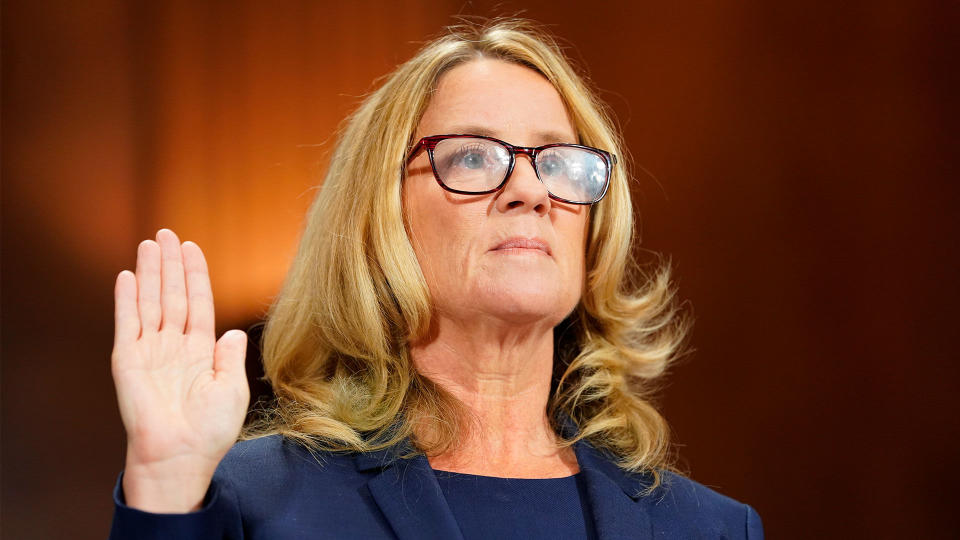
On Sept. 27, Dr. Christine Blasey Ford raised her right hand—and the profile of those who speak up about against sexual assault—and testified at the confirmation hearing of Supreme Court nominee Brett Kavanaugh. "I am here today not because I want to be. I am terrified," Dr. Ford read from her prepared statement. "I am here because I believe it is my civic duty to tell you what happened to me."
The Palo Alto University professor bravely recounted the alleged assault that took place while Ford and Kavanaugh were in high school in front of the Senate Judiciary Committee, saying that the events are "seared into her memory." (Kavanaugh has categorically denied all allegations and was later confirmed as a Supreme Court Justice on Oct. 6.)
Her testimony—and the subsequent questioning she endured before the committee and in the public eye—ignited a global conversation about the treatment of sexual assault survivors and inspired others to come forward and share their experiences. "The idea that someone who you look up to, that someone that you respect believes you, changes everything," said 'me too.' founder Tarana Burke. "That's a small thing to ask."
Diverse movies shatter Hollywood records
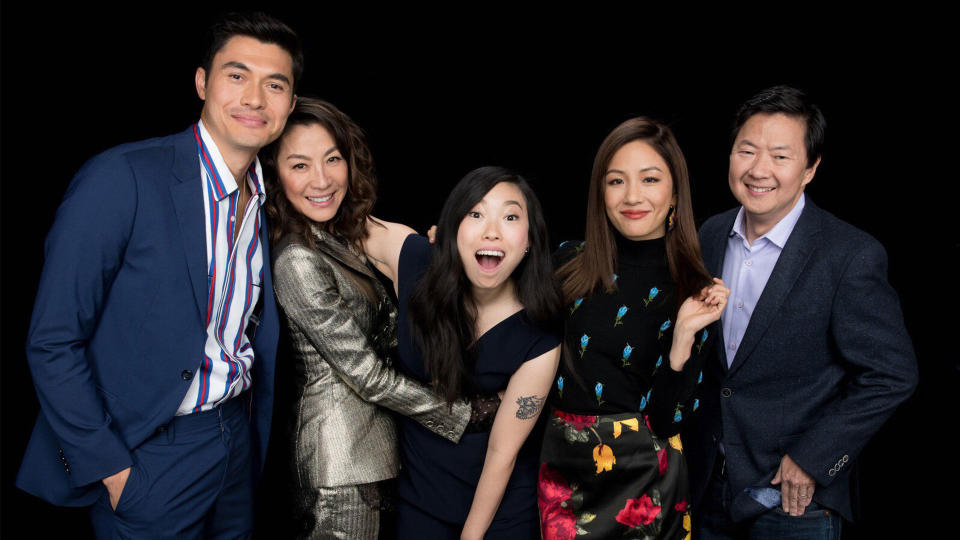
2018 marked a banner year for diversity on the big screen. Crazy Rich Asians—the first movie from a major Hollywood studio with Asian-American leads since 1993's Joy Luck Club—experienced crazy success this past summer, topping the box office during its opening weekend with $34 million. According to HuffPost, Crazy Rich Asians is the highest-grossing romantic comedy since 2009.
But the motto for 2018 may as well be "Wakanda Forever." Black Panther broke all the records this year with a predominantly black cast directed by Ryan Coogler and set to a score by Pulitzer Prize-winning rapper Kendrick Lamar. The Marvel film is now the highest-grossing superhero movie in U.S. history, raking in over $700 million in the United States alone.
Meghan Markle crowned a feminist princess
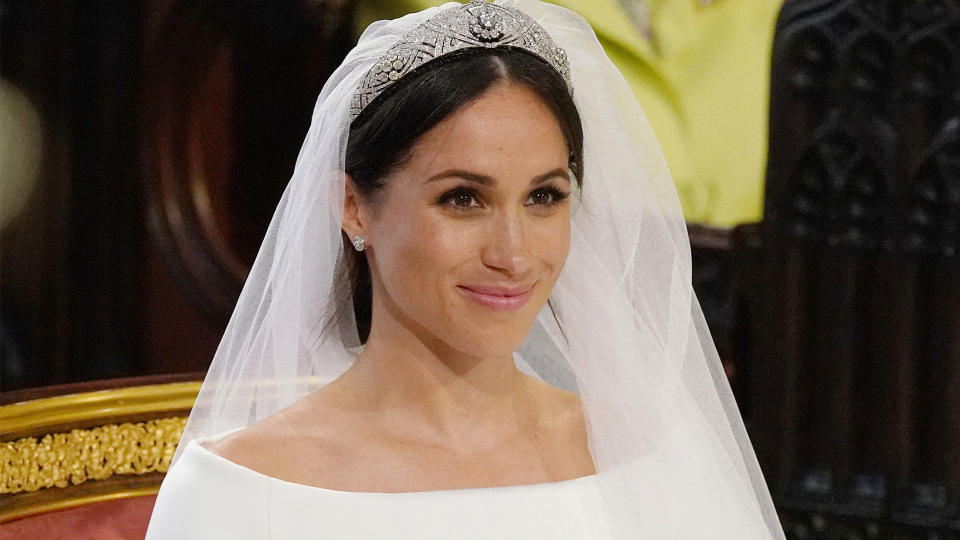
When Meghan Markle married Prince Harry on May 19, the former actress officially entered the royal family as the Duchess of Sussex and began her reign as the feminist princess we've been waiting for. From her stunning wedding dress to her vows to the fanfare, Markle made sure to put her signature feminist stamp on her big day and even declared on her official royal biography "I am proud to be a woman and a feminist."
And she continues to use her platform to fight for gender equality. On her first official royal tour with Prince Harry, Markle turned the spotlight on girls' education during her debut royal speech; she supported feminist fashion brands by women including tennis icon and friend Serena Williams; and she reinforced that "feminism is about fairness" during a speech in New Zealand, the first country in the world to grant women the right to vote. "Suffrage is not simply about the right to vote," Markle said. "But also about what that represents: the basic and fundamental human right of being able to participate in the choices for your future and your community."
Time's Up starts a movement
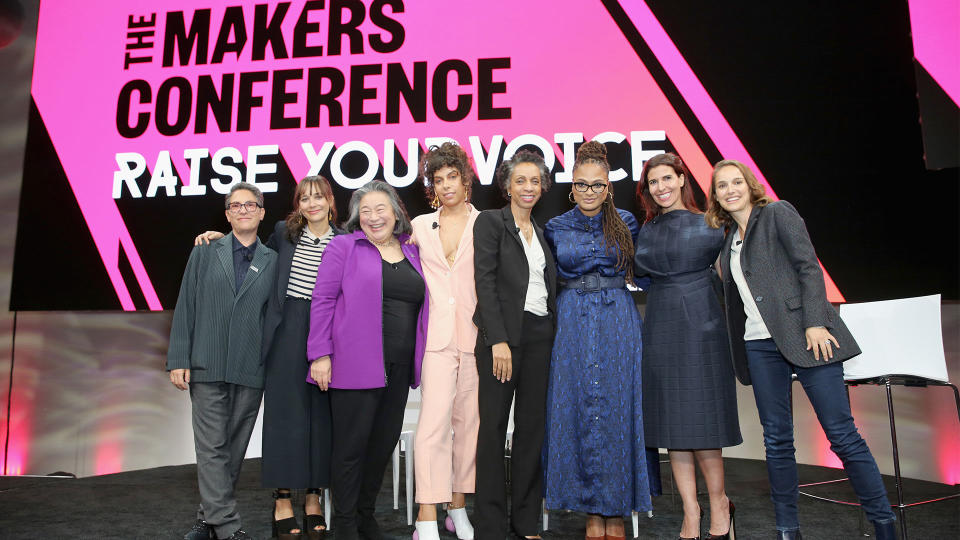
The new year started with a new movement: On January 1, more than 300 women from the entertainment industry launched Time's Up to address systemic inequality and injustice in the workplace. Powered by high-profile women in entertainment including Reese Witherspoon, Natalie Portman, America Ferrera, Michelle Kydd Lee, and policy experts like Tina Tchen, "this is basically the Avengers," Ava Duvernay said during the Time's Up panel at the 2018 MAKERS Conference.
Believing that workplace inequality is at the root of all sexual harassment, the organization partners with leading advocates to improve working conditions across all industries and enables more women and men access to legal support through the Time's Up Legal Defense Fund which has raised more than $22 million. "All of our voices matter," said Portman at the MAKERS Conference. "We all have stories to tell and we need to stop being silent about injustice."
Serena Williams Stands up to sexism over and over again
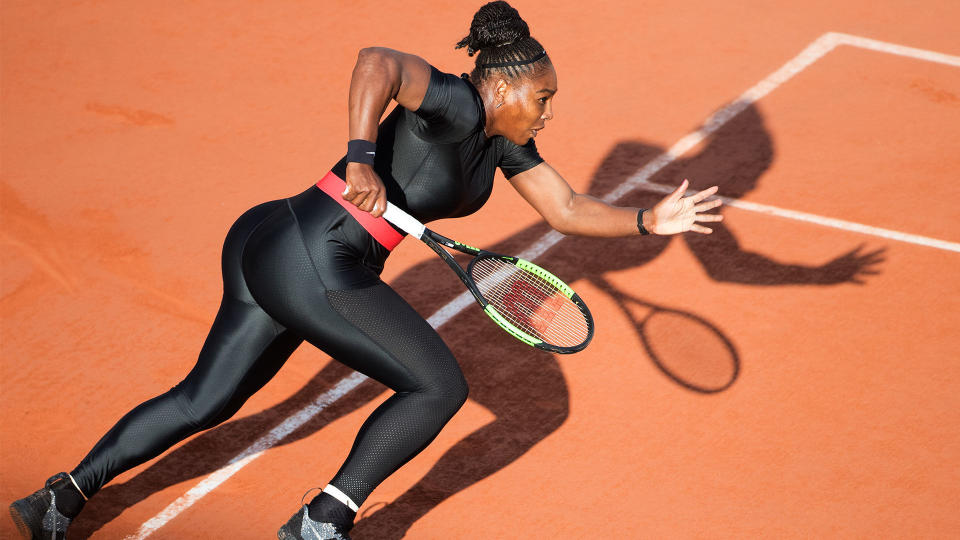
There's no challenger tennis icon Serena Williams won't face— including sexism. During a heated showdown at the U.S. Open women's finals match in September, Williams challenged the umpire of the game multiple times and was handed a penalty that led to her defeat by Naomi Osaka.
"There's a lot of men out here that have said a lot of things, but because they're men that doesn't happen to them," Williams called out to the umpire. After the match, Williams says she didn't regret her actions. "This is an example for the next person that has emotions and that want to express themselves and want to be a strong woman," she said. "They're going to be allowed to do that because of today."
Senator Tammy Duckworth brings her newborn to Congress
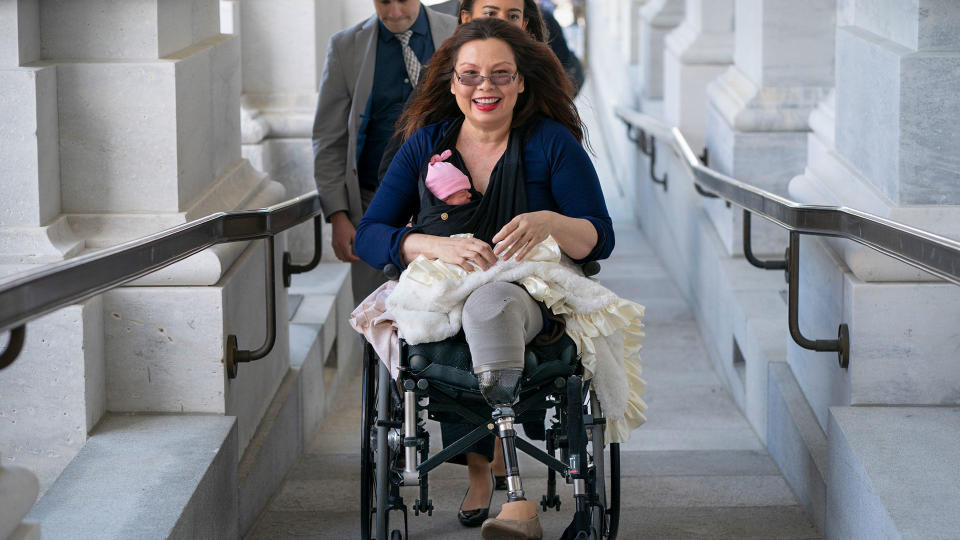
In the ongoing battle against sexism in Capitol Hill, Sen. Tammy Duckworth (D-Il) made history on April 9 becoming the first sitting U.S. senator to give birth. She later brought her newborn to the Senate floor to cast her vote in another first.
In an interview with CBS, Duckworth, however, was quick to point out the "ridiculousness" of her history-making moment. "We need more diversity. The whole being the first sitting senator to give birth is ridiculous. It's 2018. We need more female senators."
The Women's Wave sweeps the nation
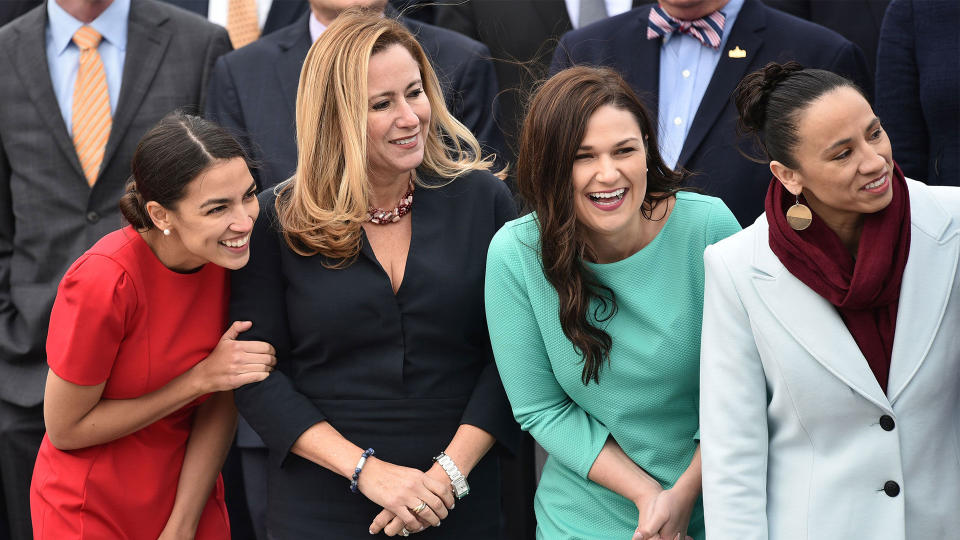
In 2018, women broke records running for office at all levels of government— and won. There are now 124 women elected, with 102 women in the House, 13 women in the Senate, and nine female governors at the national level.
This year's election also smashed records for historic firsts and diversity. The first Muslim women (Ilhan Omar and Rashida Tlaib) and the first Native American women (Debra Haaland and Sharice Davids) will be just a few of the faces making Congress a little male and a little less pale. "I know for a fact none of us ran to make history," said Ayanna Pressley, the first black female congresswoman to represent Massachusetts. "We ran to make change."
